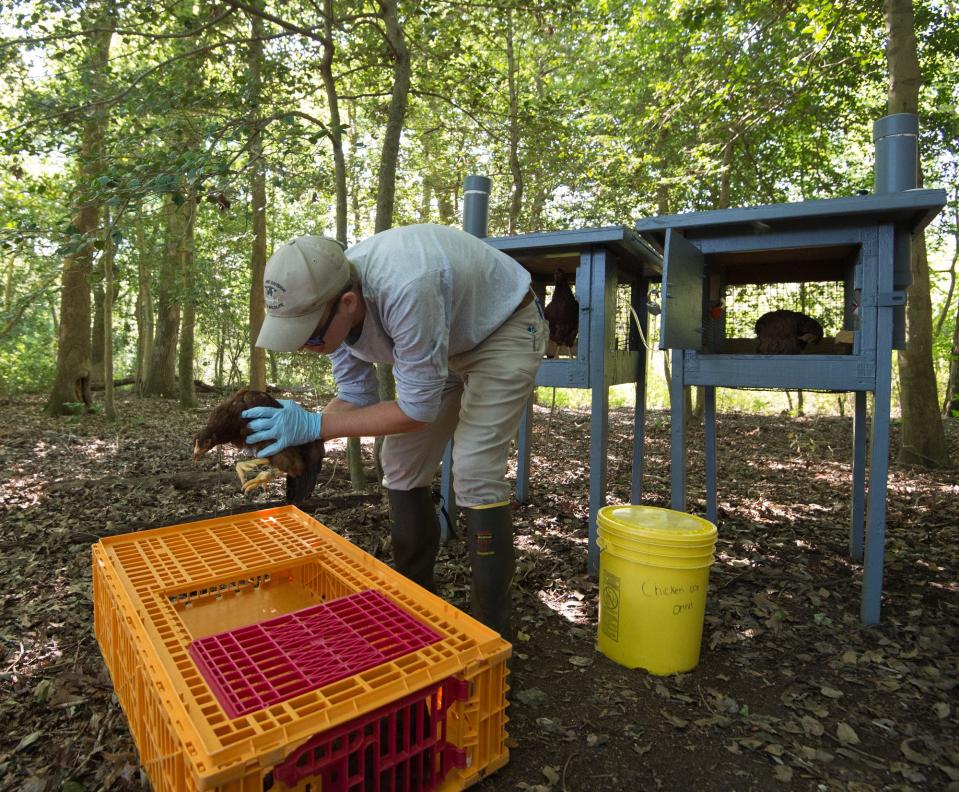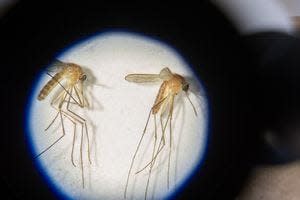Watch out for mosquitoes: Delaware announces first human West Nile virus case of the year
The state Division of Public Health announced Wednesday that a 78-year-old Sussex County man has become the first person to be diagnosed with West Nile virus this year.
A mosquito-borne illness, West Nile virus can cause serious health problems, according to DPH. The virus has already been confirmed in a horse in New Castle County and in 19 sentinel chickens in outdoor-caged and "humanely tended stations" maintained throughout the state by the Department of Natural Resources and Environmental Control.
DNREC’s Mosquito Control section announced West Nile virus in sentinel chickens for the first time in July 2021. Mosquito-transmitted virus detections in DNREC’s sentinel chickens are unrelated to Delaware’s poultry industry.
While the mosquitoes that cause West Nile virus mostly bite during the evening and morning hours, DPH advised Delawareans to protect themselves by wearing insect repellant anytime they go outdoors because mosquitoes that cause other diseases − such as chikungunya, dengue fever and Zika − can bite during the day.

The arrival of West Nile virus in a human comes only a few weeks after DNREC announced that it had detected a potentially fatal mosquito-borne disease in a Delaware chicken population used to monitor mosquito-transmitted viruses.
Eastern equine encephalitis, which is deadlier than West Nile virus and also known as Triple E, was found in a chicken in northern New Castle County. This was the first time this year that the illness had been detected, and it had not been found in humans.
ANOTHER VIRUS:Potentially fatal mosquito-borne disease Triple E found in New Castle County chicken
Triple E and the West Nile virus are typically a threat until "colder autumn temperatures in late-October or later," according to DNREC. The peak period for disease transmission for the West Nile virus is mid-August to mid-October.
What are the symptoms of West Nile virus?
About 80% of people who are infected with the West Nile virus will not get sick, according to DPH, and fewer than 20% may develop mild symptoms such as fever, headache, body aches, a skin rash on the chest or back, and swollen lymph glands.
About one in 150 people infected will develop a severe infection that may include headache, high fever, stiff neck, tremors or convulsions, muscle weakness, encephalitis or meningitis − all possibly leading to hospitalization and very rarely death, DPH said.
Those most at risk of contracting the West Nile virus include older adults and those with weakened immune systems. State health officials advised anyone who experiences severe symptoms to immediately seek medical assistance.

How to avoid mosquito bites and reduce risk of infection
Since the risk of mosquito-borne illnesses lasts through mid-October or later, DPH advises Delawareans continue to take the following precautions:
Use Environmental Protection Agency-registered insect repellents. Follow the manufacturer's instructions for reapplication times.
If using sunscreen, apply it first and insect repellent second.
When using mosquito repellant on children, adults should spray the repellent onto their hands and then apply it to the child's face. Do not apply insect repellent onto a child's hands, eyes, mouth, or on cuts or irritated skin.
Do not use insect repellent on babies younger than 2 months of age.
When outside during periods of mosquito activity, wear light-colored long-sleeved shirts and long pants.
Dress children in clothing that covers arms and legs.
Consider using mosquito netting, which offers protection to the face and neck and also protects infants in carriages, strollers and playpens.
Use permethrin (an insecticide) to treat clothing and gear (such as boots, pants, socks, and tents), but do not apply to the skin.
Prevent mosquitoes from entering the house by using screens and tightly sealed windows and doorways.
AVOID MOSQUITOES:Ouch! Still getting mosquito bites? Here's what you need to know about the late-season pests.
Helpful phone numbers, websites
To report suspected cases of human West Nile virus, call the DPH Office of Infectious Disease Epidemiology at 888-295-5156.
For more information about mosquitoes and mosquito-borne illnesses, use the following resources:
For mosquito biology/ecology and control, call the DNREC Mosquito Control section office in Dover at 302-739-9917.
For requests for mosquito relief, call Mosquito Control’s Glasgow field office at 302-836-2555 for areas including Dover and north. Call Mosquito Control’s Milford field office at 302-422-1512 for areas south of Dover.
For animal health questions, calls the Delaware Department of Agriculture’s Poultry and Animal Health Section at 302-698-4500.
For more information on West Nile virus or Eastern equine encephalitis, visit dhss.delaware.gov/dhss/dph/epi/wnv.html.
For more information on how to prevent West Nile virus, visit the Centers for Disease Control and Prevention’s website: www.cdc.gov/westnile/prevention/index.html.
Emily Lytle covers Sussex County from the inland towns to the beaches, with a focus on health-related issues. Got a story she should tell? Contact her at elytle@delmarvanow.com or 302-332-0370. Follow her on Twitter at @emily3lytle.
This article originally appeared on Delaware News Journal: Delaware reports first human case of West Nile virus this year

